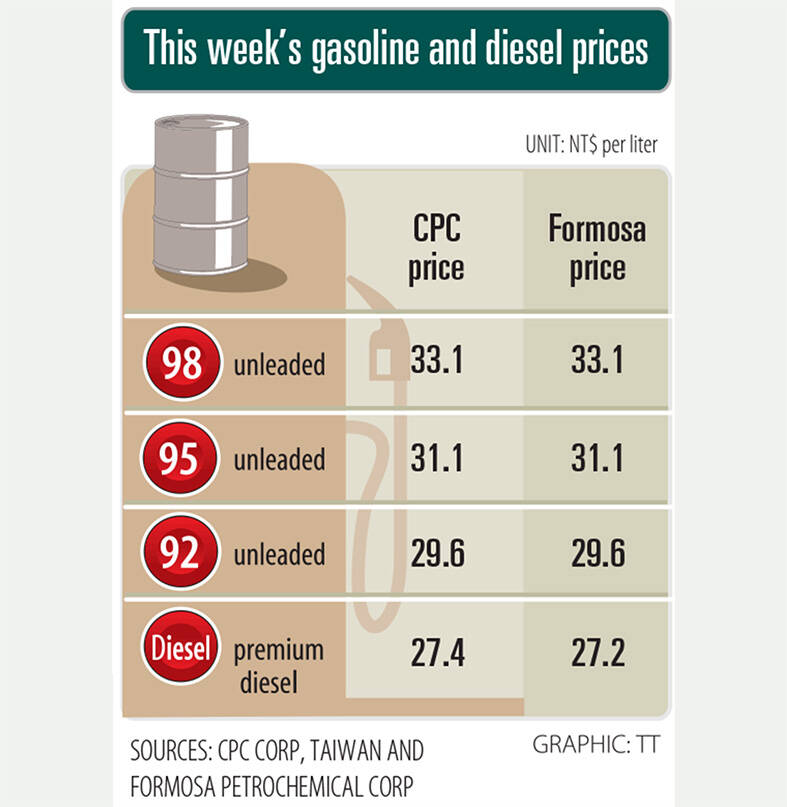Gasoline prices are to fall NT$0.2 per liter this week, after rising for the past three weeks, as global crude oil prices moved lower last week, CPC Corp, Taiwan (CPC, 台灣中油) and Formosa Petrochemical Corp (台塑石化) said in separate statements yesterday.
Crude oil prices fell as the market expected the US Federal Reserve to raise interest rates by 25 basis points next month, and US retail sales fell in February and last month, pointing to a slowing US economy and signaling weak demand for oil, CPC said.
Prices were also affected by the unexpected rise in US gasoline inventories last week, along with an increase in US unemployment claims, Formosa said.

Gasoline prices at CPC and Formosa stations are today to decrease to NT$29.6, NT$31.1 and NT$33.1 per liter for 92, 95 and 98-octane unleaded gasoline respectively, the companies said.
The price of premium diesel is also to fall NT$0.2 per liter to NT$27.4 at CPC stations and to NT$27.2 at Formosa pumps, they said.
Separately, CPC on Friday launched charging facilities for electric vehicles (EVs) at its Guangming gas station in Hsinchu City, and said it would offer free charging at the location until May 21.
The facilities include two 200 kilowatt (kW) charging piles with double connectors, three 100kW fast-charging piles with double connectors, and four 7kW slow-charging piles with single connectors, which meet the charging needs of US and European EV models, CPC said in a separate statement.
The project is part of the company’s transformation plans as it aims to build 28 fast-charging stations in Taiwan and create an EV-friendly environment within five years through collaboration with major charging providers and EV vendors, CPC said.

Semiconductor shares in China surged yesterday after Reuters reported the US had ordered chipmaking giant Taiwan Semiconductor Manufacturing Co (TSMC, 台積電) to halt shipments of advanced chips to Chinese customers, which investors believe could accelerate Beijing’s self-reliance efforts. TSMC yesterday started to suspend shipments of certain sophisticated chips to some Chinese clients after receiving a letter from the US Department of Commerce imposing export restrictions on those products, Reuters reported on Sunday, citing an unnamed source. The US imposed export restrictions on TSMC’s 7-nanometer or more advanced designs, Reuters reported. Investors figured that would encourage authorities to support China’s industry and bought shares

FLEXIBLE: Taiwan can develop its own ground station equipment, and has highly competitive manufacturers and suppliers with diversified production, the MOEA said The Ministry of Economic Affairs (MOEA) yesterday disputed reports that suppliers to US-based Space Exploration Technologies Corp (SpaceX) had been asked to move production out of Taiwan. Reuters had reported on Tuesday last week that Elon Musk-owned SpaceX had asked their manufacturers to produce outside of Taiwan given geopolitical risks and that at least one Taiwanese supplier had been pushed to relocate production to Vietnam. SpaceX’s requests place a renewed focus on the contentious relationship Musk has had with Taiwan, especially after he said last year that Taiwan is an “integral part” of China, sparking sharp criticism from Taiwanese authorities. The ministry said

US President Joe Biden’s administration is racing to complete CHIPS and Science Act agreements with companies such as Intel Corp and Samsung Electronics Co, aiming to shore up one of its signature initiatives before US president-elect Donald Trump enters the White House. The US Department of Commerce has allocated more than 90 percent of the US$39 billion in grants under the act, a landmark law enacted in 2022 designed to rebuild the domestic chip industry. However, the agency has only announced one binding agreement so far. The next two months would prove critical for more than 20 companies still in the process

CHANGING JAPAN: Nvidia-powered AI services over cellular networks ‘will result in an artificial intelligence grid that runs across Japan,’ Nvidia’s Jensen Huang said Softbank Group Corp would be the first to build a supercomputer with chips using Nvidia Corp’s new Blackwell design, a demonstration of the Japanese company’s ambitions to catch up on artificial intelligence (AI). The group’s telecom unit, Softbank Corp, plans to build Japan’s most powerful AI supercomputer to support local services, it said. That computer would be based on Nvidia’s DGX B200 product, which combines computer processors with so-called AI accelerator chips. A follow-up effort will feature Grace Blackwell, a more advanced version, the company said. The announcement indicates that Softbank Group, which until early 2019 owned 4.9 percent of Nvidia, has secured a